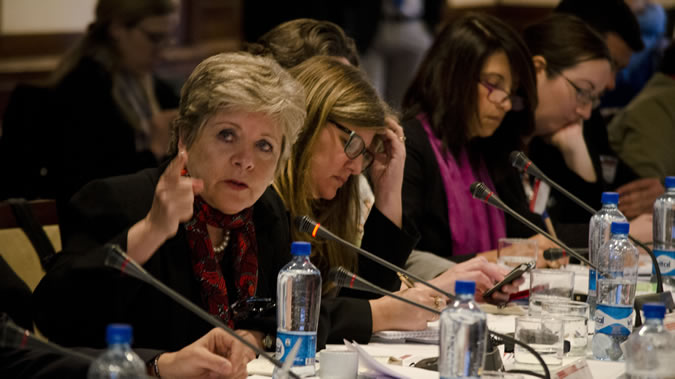Alicia Bárcena: Development Assistance Should Continue Flowing to Middle-Income Countries in Latin America and the Caribbean
ECLAC’s Executive Secretary participated in a dialogue on development cooperation held in Santiago, Chile.

Development levels should be evaluated using a comprehensive approach and not solely on the basis of per capita income, Alicia Bárcena, the Executive Secretary of the Economic Commission for Latin America and the Caribbean (ECLAC), said today, adding that middle-income countries in the region should continue receiving official development assistance (ODA) to be able to make progress on closing the gaps that persist in diverse areas.
Alicia Bárcena participated in the LAC-DAC Dialogue on Development Cooperation held on June 29 at the seat of Chile’s Foreign Affairs Ministry and organized by the Chilean International Cooperation for Development Agency (AGCID), the Mexican Agency for International Development Cooperation (AMEXCID) and the Development Assistance Committee (DAC) of the Organization for Economic Co-operation and Development (OECD).
Participating in the meeting’s inauguration were Ricardo Herrera, Executive Director of AGCID; Bruno Figueroa, General Director for the Mesoamerican Integration and Development Project of AMEXCID; and Mario Pezzini, Acting Director of OECD’s Development Cooperation Directorate.
In a presentation on the role of cooperation in the implementation of the 2030 Agenda for Sustainable Development in Latin America and the Caribbean, ECLAC’s Executive Secretary recalled that 28 of the region’s 33 countries are considered to be middle income according to their per capita income levels, although notable disparities remain with regard to other development variables, both among nations and within each of them.
“It is not possible to equate a country’s income level with its development level, which implies evaluating other gaps,” said Alicia Bárcena, who mentioned differences in terms of poverty and inequality, investment and savings, infrastructure, productivity and innovation, education, health and social security, financing and taxation, gender equality and environmental sustainability, among others.
In light of the possibility that the OECD’s Development Assistance Committee “graduates” countries in 2017—meaning that it removes several nations in the region from the list of ODA recipients, among them Antigua and Barbuda, Chile and Uruguay—ECLAC’s Executive Secretary stressed that there is not a single classification or uniform criteria for evaluating development needs.
ECLAC’s most senior representative underlined that the per capita income level of a country does not reflect its capacity to save, to mobilize domestic resources, or to access external capital markets and other sources of financing to promote development. The size of the economies, their structural characteristics and the external scenario that they face are some of the factors that have an impact on all of those elements, she explained.
That is the case with the Small Island Developing States (SIDS) of the Caribbean, which need additional support to confront the damage caused by extreme natural phenomena, one of the causes of their high indebtedness. Considering that, ECLAC has proposed that part of their debt be relieved to create a resilience fund that enables them to finance actions for mitigating and adapting to climate change.
Regarding Latin America and the Caribbean as a whole, Alicia Bárcena said that as ODA flows have decreased, the region has begun depending on private flows to a greater extent. In fact, foreign direct investment (FDI) and remittances constitute the bulk of external financing (52% and 26% of the total, respectively). At the same time, the illicit financial flows estimated to have left the region between 2003 and 2012 grew to $320 billion dollars a year, which was double the level of remittances and 16 times bigger than ODA.
In this scenario, according to Alicia Bárcena, it is vital that the public sector intervene to attract private investment towards the development needs laid out in the 2030 Agenda, while also tapping into innovative sources of financing and new modalities for collaboration, such as South-South Cooperation, to protect the interests of middle-income countries and address the harmful fiscal competition between States, among other goals.
These and other proposals are set forth in the document Horizons 2030: Equality at the Centre of Sustainable Development, presented by ECLAC last May, in which the organization offers a roadmap for the region’s implementation of the 2030 Agenda, adopted in 2015 by the United Nations’ 193 member states.
Related content
El rol de la cooperación en la implementación de la Agenda 2030 para el Desarrollo Sostenible en América Latina y el Caribe
Presentación de la Secretaria Ejecutiva de la CEPAL, Alicia Bárcena, en el Diálogo sobre la Cooperación para el Desarrollo ALC-CAD.